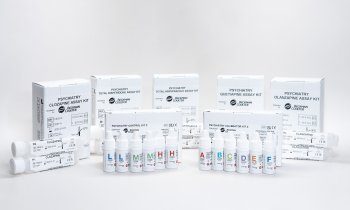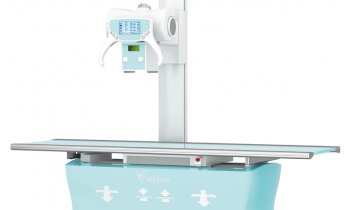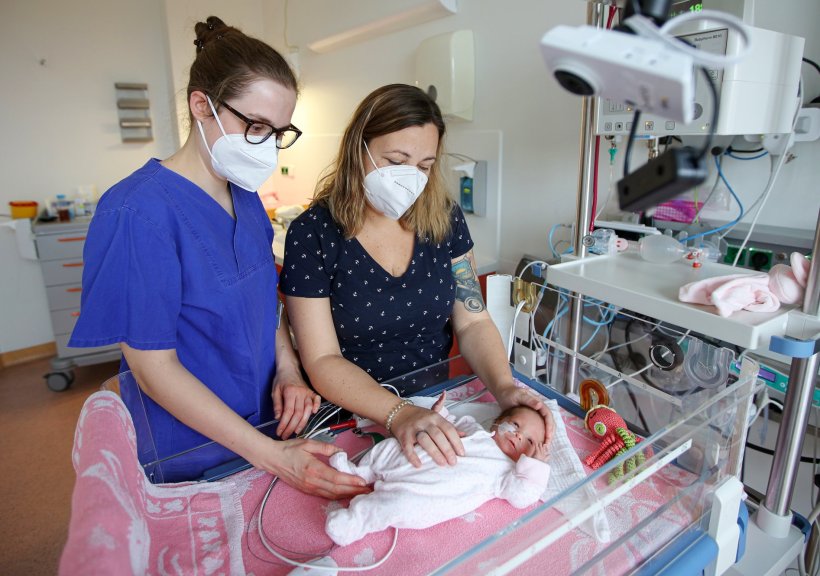
© Diakoneo KdöR
Article • Webcams in neonatology offer clinical value
Baby on-screen 24/7
True or false: Webcams have only recently been introduced in neonatology and are a patient-side component of the Digital Health Portfolio. False! Already in 1989, Professor Dr Roland Wauer at Charité Berlin built his DIY system to transmit images from the neonatology ward.
Report: Manuela Giesel
Today, there is only one such commercial webcam system available in Europe despite the market being huge: in 2020, in Germany alone 60,682 babies were born prematurely. The technology is not only used in neonatology but also in paediatric ICUs and mother-child units. In additions, since the Covid-19 pandemic it is also monitoring ventilated patients.
How does BabyWatch work?
The specialized webcam allows parents to see their child on a smartphone, tablet or desktop around the clock and in real-time. Thus, digitalization can contribute significantly to the bonding process between child and parents, siblings or grandparents. This might sound counterintuitive since in this crucial phase physical proximity, heartbeat and the smell of the baby are the foundation of a tight bond. However, successful bonding is also possible when the baby’s status upon delivery and immediately afterwards does not allow physical contact. Several factors can positively influence bonding at a later stage, e.g. stress-free and enjoyable observation of facial expressions, gestures or minute movements of baby. The webcam complements and strengthens bonding, explains Professor Dr Andreas Holzinger, medical director of the paediatric clinic at Diakoneo Klinikum, where in November 2021 twelve “baby TV” cameras were installed: ‘Studies, for example those conducted by Professor Dr Hans Proquitté at the University of Jena, have shown that for the milk production it is important for the mother to see the baby.’
The system in clinical routine
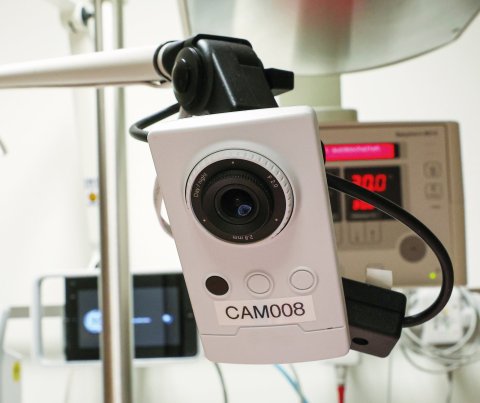
© Diakoneo KdöR
The fairly small camera, which is mounted on a flexible arm above the incubator, transmits live images. Using a password-protected access parents can see their baby in a livestream from anywhere – either mobile or from home. The data is transmitted with 256 bit SSL encryption; data storage complies with GDPR requirements regarding user and camera management during data transfer and is handled by the admin server in a German high-performance computer centre. Images are transmitted in real-time, albeit without sound from the ward – which is an important aspect in a clinical environment. During the day, the livestream is in colour, at night in black and white. The parents and relatives see the baby’s head and upper body. A control light indicates to the nursing staff whether the camera is turned off or whether the parents are “babywatching”.
Advantages and drawbacks
There were concerns that the baby TV would introduce a form of control and that the staff would have to deal with an increased number of phone calls from anxious parents
Andreas Holzinger
While in theory the baby TV idea sounded great, in reality 'it was not met with undivided enthusiasm', remembers Dr Holzinger and explains that 'there were concerns that the baby TV would introduce a form of control and that the staff would have to deal with an increased number of phone calls from anxious parents. Moreover, would the livestream mean that parents don’t come to the hospital anymore because they are sitting in front of their screens at home? These were all valid concerns. To address them, team members of different professions spent time at the clinic of my colleague Dr Matthias Henschen who had been working with BabyWatch for two years.' This cooperation indeed alleviated concerns and a majority of the team members were willing to try the webcam system. But staff concerns were not the only hurdle to overcome: considerable purchasing and follow-up costs were frowned upon as just another financial burden in the already cost-intensive paediatric department. In the end, purchasing and financing were secured through a fundraising drive initiated by the clinic and the support by the Friends of the Paediatric Clinic.
Premature births during the coronavirus pandemic
In the paediatric ICUs, specially trained nursing and medical staff care for the small patients 24/7 with immense dedication and expertise when a baby’s birth happens much too early or when complications arise. In paediatric departments, complying with corona rules has severe effects on the neonates, parents and siblings. Because of the pandemic, in many hospitals around the world physical contact between parents and their babies was limited in line with WHO recommendations. Michelle Wunderlich was thrown into this difficult situation: in November 2021, at the height of the fourth Covid-19 wave, the 37-year-old nurse gave birth to twins. After pre-eclampsia, Ella and Paul were born eight weeks early and were put into intensive care right away. 'It was a horrible feeling,' the mother says and adds 'I was worried sick about my children. In the first days after the Caesarean section I missed the babies in my belly – I felt incomplete.'
Hundreds of questions overwhelmed Michelle and the babies’ father: how are our children in the incubator? Are they agitated? Are they sleeping or are they crying? Are they moving or calm? The camera made it possible for them to see their children and bond with them. The own fears, but also the grandparents’ fears slowly subsided and indeed the difficult situation had created a new kind of bond between the members of the family. After a few days – and in full compliance with the strict corona rules – Michelle Wunderlich and her husband were allowed to visit Ella and Paul. The first physical contact was a moving moment for the young parents. The family live far away from the hospital, one of the grandmothers even lives in a different country. One of the babies’ status stabilized faster than the other’s and it could leave the hospital shortly before Christmas; the second one however had to stay for several more weeks.
Caring for neonates has many high points and many low points. BabyWatch allows parents like Michelle Wunderlich and her husband to share the worries and the joy with siblings and relatives. The broadcast images enable physical and psychological closeness. 'Despite my daily visits in the paediatric clinic I was happy to see my baby on camera at home. It reduced the distance and I no longer had the feeling that I give one of the babies more of my love than to the other,' Michelle Wunderlich sums up her feelings.
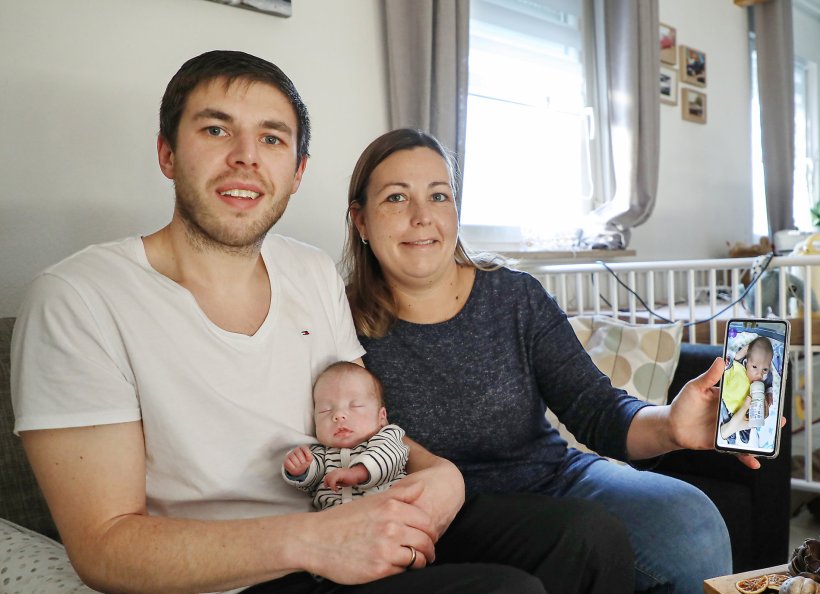
© Diakoneo KdöR
What does science say?
A study conducted by Professor Proquitté of University Hospital Jena, Germany, during his time at Charité Berlin highlighted the psychological benefits of the BabyWatch system. Many parents, he said, feel guilty or even responsible for their baby’s premature birth. “Baby TV” helps parents feel closer to their children. Moreover, in the study hospital staff reported that – unexpectedly – with the webcams the parents visit their babies more frequently since early streaming creates a bond with their children in the hospital which increases the desire for personal and close contact. In addition, the frequent livestream via the webcam alleviates the parents’ fear that their children are not well. “Some studies indicate that BabyWatch supports early bonding but there is no scientific evidence yet as to its effectiveness,” explains Professor Holzinger. A highly anticipated new study conducted by private docent Dr Nadine Scholten from the University of Cologne might offer new insights. Her team at the department of medicine sociology, care research and rehabilitation science has been researching the topic in cooperation with four hospitals. Results are expected in summer 2023.
Profile:
Manuela Giesel is head of health communication and fundraising at Diakoneo KdöR.
01.03.2023









